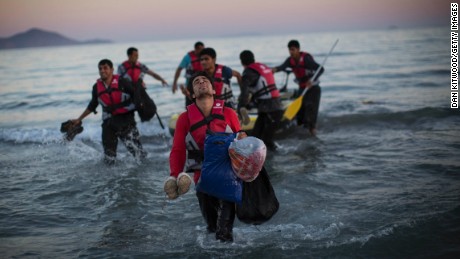West to blame for Europe's migrant crisis, say Erdogan, Putin
Who's to blame for Europe's deepening refugee crisis? To hear Erdogan and Putin tell it, it's the West.
Turkish President Recep Tayyip Erdogan and Russian leader Vladimir Putin both point the finger at Europe and the United States for what has now become one of the biggest mass migrations of people in modern times.
"To be honest, the whole Western world is to be blamed in my opinion on this issue," Erdogan told CNN on Thursday.
Putin, talking to reporters Friday, said it's the West's wrong-headed foreign policy in the Middle East and Northern Africa that's at the root of the crisis.
Desperate men and women, with little children in tow, are fleeing war-ravaged Syria or Iraq in overcrowded and often deadly voyages by land or sea. When they reach their destination - Europe -- they are met with a patchwork of different policies.

Europe's refugee crisis in 20 photos



Earlier this week, the image of 2-year-old Aylan Kurdi's body, face down in the surf of a Turkish beach, rocketed around the world. He died along with his 4-year-old brother and mother -- three of several thousand refugees and migrants who have perished while trying to find safety in Europe.
Europe's response so far has been disjointed and divided, prompting nations to scramble for a cohesive response.
The crisis will be front-and-center when EU foreign ministers meet at an informal gathering in Luxembourg on Friday. The nations will send their home ministers for emergency talks in Brussels on September 14.
Opinion: Why the world needed to see Aylan Kurdi photos
Erdogan: 'Give these people an opportunity'
Erdogan has accused Europe of turning the Mediterranean into a cemetery. In his interview with CNN, he stood by those remarks.
"That's the reality on the ground," he said. "Because the countries bordering round the Mediterranean -- they do not want these people no matter what the cost."
Turkey, he said, has welcomed refugees, and European countries -- including, he said, Greece, Italy, Spain, France and Hungary -- could easily do the same.
Instead, Hungary has begun building a wall designed to keep people trying to reach the safety of northern Europe from transiting its territory.
European countries, Erdogan said, need to "conduct a joint operation and give these people an opportunity to save themselves."
"This picture you were showing, we do not want to see similar cases," he said.
Europeans distraught, divided as migrant crisis worsens
Putin: Europe 'blindly following U.S.'
Putin, speaking to the Russian news agency TASS, said he warned the West about the possible consequences of its Mideast and Africa policy several years ago.
"What is this policy about? This is imposing its standards without taking into consideration historic, religious, national and cultural specifics of these regions," Putintold the Russian news agency TASS at the Eastern Economic Forum in Vladivostok. "This is first of all, the policy of our American partners."
"I am looking with surprise at certain American mass media now criticizing Europe for an excessively tough, as they believe, treatment of migrants," Putin added.
Europe is "blindly following U.S. instructions" and suffering greatly, he said.
News Courtesy: www.cnn.com











